Park of the Month: Chippokes Plantation State Park
Explore Virginia Heritage at thePork, Peanut & Pine Festival July 20-21, 2013
Some historians say the triumvirate of pork, peanuts, and pine trees created the foundation of Virginia's diverse cultural history and its, generally, stable economy. Akin to the old county fair, theChippokes Plantation State Park explores and celebrates the history of these three commodities against the backdrop of music, good food, and artisan crafts.

Local and regional musicians are scheduled on the main stage throughout the weekend
PORK
At the heart of the merging of the three culinary traditions (Virginia Indian, African, and Colonial European) that dominate southern cooking, pork stands out. Be it famous Virginia peanut-cured ham or slow-smoked pulled pork BBQ, pork is the mainstay of many southern dishes.
In colonial times, domestic hogs weren't always domesticated per se. Set free to roam the forests fattening up on acorns, tubers, and roots, the hogs were rounded up after frost to be processed and preserved providing much needed proteins and fats to survive the winter.
A pork-butt and pork-rib BBQ contest is part of the annual here.
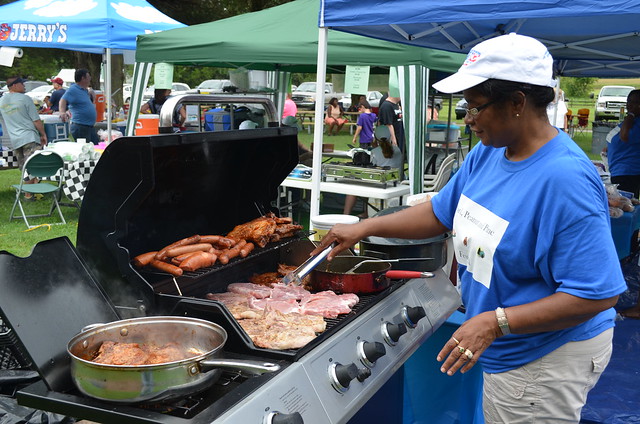
Real southern BBQ tops the menu at the festival
PEANUTS
According to thePlanters Peanut Center in Suffolk, Virginia (about 25 miles from Chippokes Plantation State Park), peanuts were carried to Africa by South American explorers and then brought to the New World by colonial traders. Mostly considered fodder for cattle and hogs, peanuts were not considered a food product for humans until Dr. George Washington Carver recommended farmers plant peanuts after boll weevils devastated cotton crops and the traveling P.T. Barnum's circus popularized roasted peanuts.
The first commercial peanut crop in Virginia was grown in Waverly, Virginia–just a stone's throw from the park. Today, peanuts are a multi-million dollar industry in Virginia and the contract farmers atChippokes rotate planting peanuts with corn, cotton, wheat, and soybeans. Depending on the year and the time of your visit, you might just catch the farmers and harvesters at work collecting the fruits of their labor.
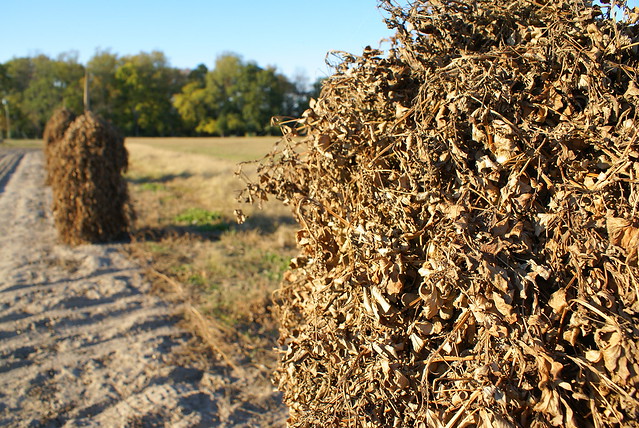
Peanuts are piled onto stakes for harvesting
At the Pork, Peanut and Pine Festival, you'll have a chance to sample roasted peanuts, different southern food cooked with peanuts, and watch how peanuts were harvested in colonial times.Hearth cooking demonstration at the brick kitchen will also feature historic food preparation techniques that were in use during colonial times.
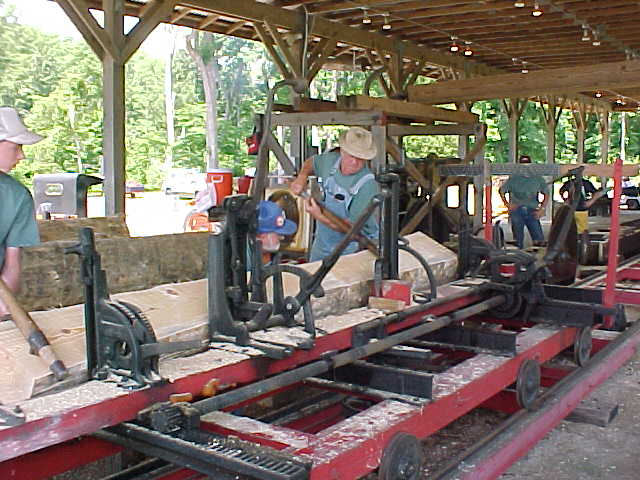
Volunteers run knotty pine through the historic saw mill
PINE
Considered the backbone of Virginia's ecosystem, providing food and habitat, Virginia pine stands are an important ecological resource. But they also played an important role in providing ample firewood, ships masts, and homebuilding resource for New World colonists. In fact, historians from theNortheastern Lumber Manufacturers Association write that is was not the tax on tea that angered colonists and drove the country toward revolution, but it was the British Crown's claim to all suitable Eastern White pine timber stands and the licensure and fine system for cutting these stands that so angered the colonists.
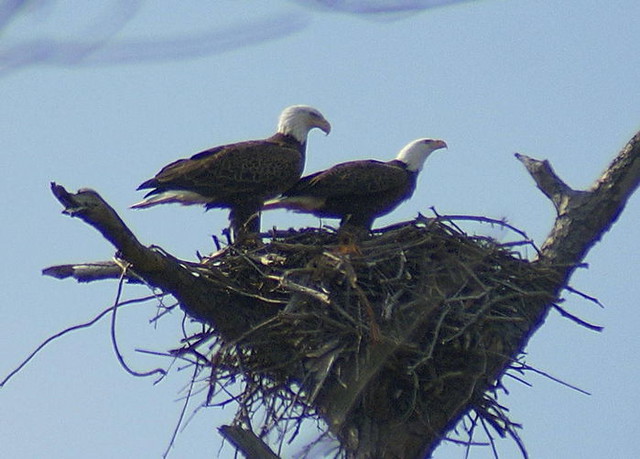
Eagles nest in the branching forks of tall dead pines at the park
Today, a fast-growing renewable resource, pines are an important commodity helping support Virginia's economy and agricultural industries. At the festival, you'll be able to see pines being milled into workable lumber during the historic sawmill exhibits scheduled for the weekend. You'll also find a variety of crafters who use pine in their artisan crafts–furniture, birdhouses, home decor and more.
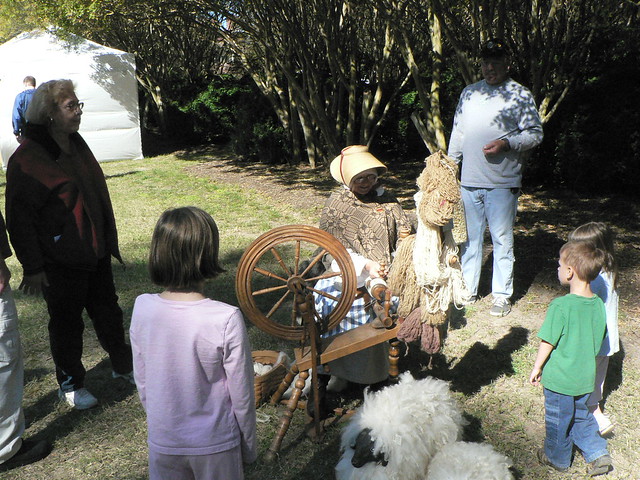
Many artisan crafters demonstrate their wares using colonial era tools
The Pork, Peanut, and Pine festival is a unique opportunity to celebrate Virginia's distinct culinary and agricultural history against the backdrop of colonial crafts and demonstrations, historic exhibits, regionally acclaimed music acts, and delicious southern foods.
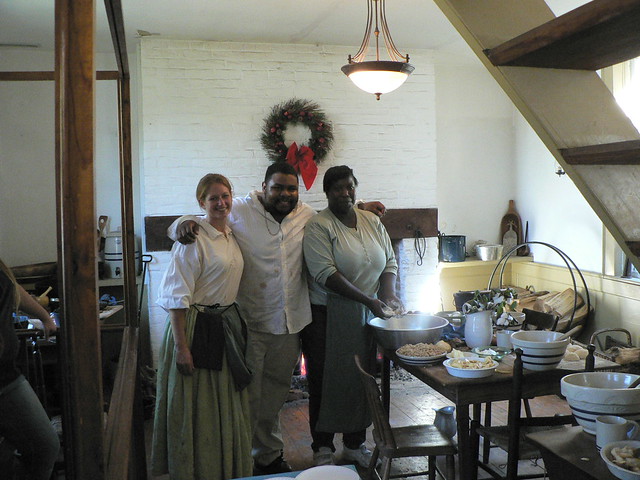
Culinary historian and blogger, Michael Twitty, works with staff in the Brick Kitchen
The festival is open from 10 a.m. to 5 p.m. each day, July 20-21, 2013.
The cost is $5 per person and children 10 and under get in free. For the most up-to-date information, including a schedule of musical performances, list of crafters, sponsorship information and more, please check the official festival website by clicking here.
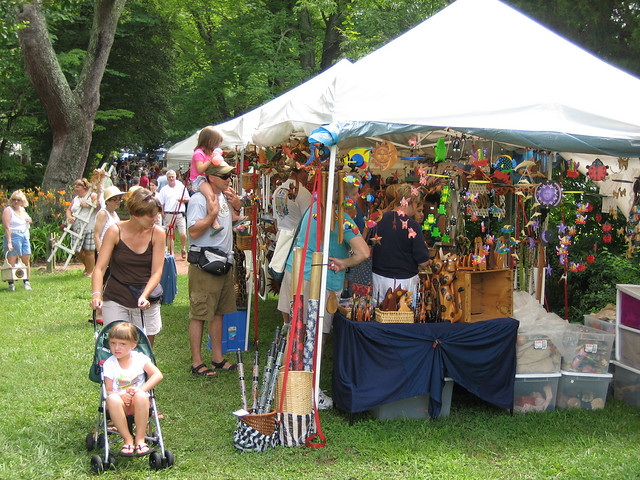
The Pork, Peanut, and Pine Festival is a fun family event
Be sure to check out the schedule fun ranger-led programs offered by here for the events listing. Guided hikes, paddling trips, mansion tours, colonial children's games and more are all part of the festival line up.

Colonial children's games and music keep the kid's entertained
Don't forget your fishing gear and swimming attire! Pack plenty of water. July days on the plantation can get very hot indeed. A plunge in the park's Olympic-sized swimming pool or lounging in the river makes for a great break during the festival.

A cool way tofish!
Location:
Chippokes Plantation State Park is accessible off Route 10 and by riding the Jamestown-Scotland ferry from the Jamestown landing off Route 199 accessible from Interstate 64. While the park does have cabins and campsites, most are already reserved for the event. Call 1-800-933-PARK to check for any last minute cancellations. However, day visitors make up the majority of festival go-ers.
